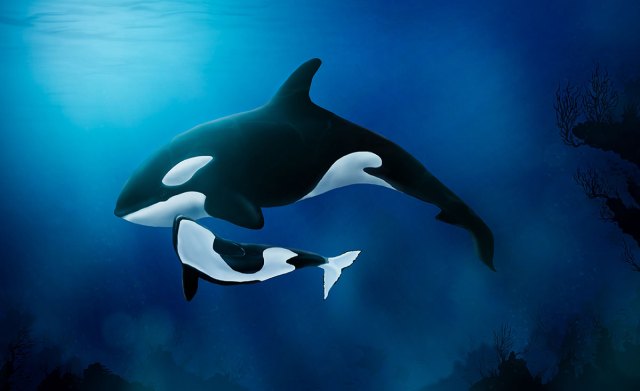Killer whale sons are so needy, they’re messing with the sustainability of the species
Killer whale moms who give birth to sons end up tending to those sons so closely for their entire lives that moms reproduce less—and generally spend their lives caring for their adult male children. That’s right, the ocean is a big giant basement, and killer whale male offspring are playing Xbox and joining 4chan groups while mom does all the work upstairs. Who knew?
A new report by NPR dives in (sorry) to the relationship in great depth (sorry). “Killer whale mothers pay a really huge cost to take care of their sons,” Michael Weiss, the research director at the Center for Whale Research tells NPR. That cost is that they have fewer offspring. “And they do this throughout their son’s life and never really stop paying that cost to keep their sons alive.”
A paper published recently in the journal Current Biology analyzed four decades of life history records of Southern Resident killer whales in the Pacific Northwest. The big takeaways from the study were that killer whale moms that continue to take care of weaned sons have a decreased reproductive output, and that the sons do not become less costly on that output as they grow older. The study also found that sons, but not daughters, “reduced their mother’s subsequent reproductive success.”
Why? When a female Orca calf grows up, she leaves her mother and becomes a functioning member of the pod, regardless of whether or not she goes on to produce offspring. The male Orca continues to rely on mom to feed him. The male Orca has a huge body that is harder to maneuver around to catch food. Mom helps—but in doing so significantly reduces her chances of having another calf. “Killer whale mothers pay a really huge cost to take care of their sons,” says Weiss. “And they do this throughout their son’s life and never really stop paying that cost to keep their sons alive.”
Why do Orca moms pay this huge price? Weiss tells NPR “the potential payoff is huge.” Enter grandchildren.
Moms with male offspring may reduce their chances of having more children, but grandchildren may become a main focus. Because when they care for their male offspring, the offspring are healthy and fed and able to father more calves. :The result is that his mom would become a grandmother multiple times over. Her genes would end up in a bunch of calves,” NPR reports. “And because they’ll be born into other pods, she wouldn’t have to spend any effort raising them.”
But Weiss argues mom’s attention may be misplaced, and what the Orca population really needs is more reproductive females. “That’s how you keep a population of slow-breeding animals going,” says Weiss. “So investing in sons for a population like ours that is so stressed is really not ideal.”
Yikes.
